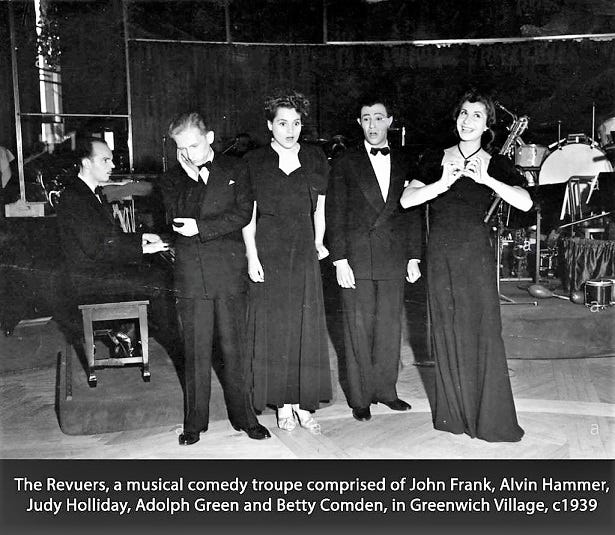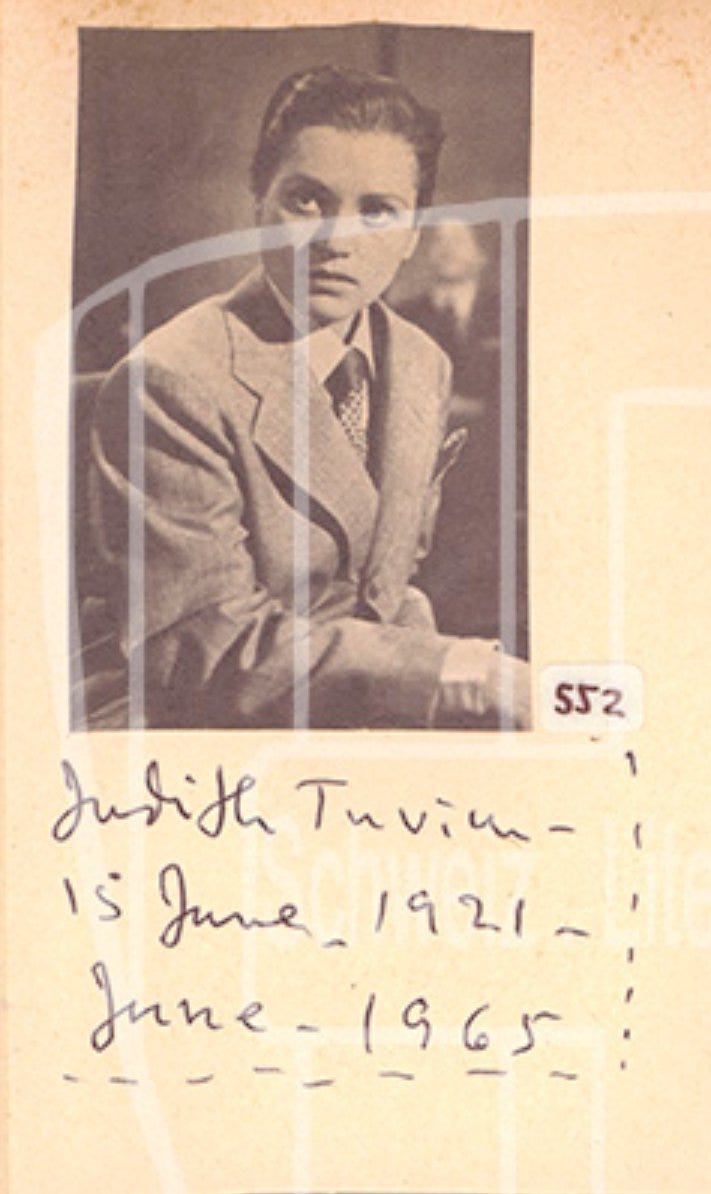What (Or Rather, Who) Got Left Out of MAESTRO
A newsletter about Judy Holliday (which means Patricia Highsmith will show up here somehow)
I saw Maestro over the weekend. I went in with below-the-floor expectations — not because of “Nosegate”, that was overblown anyway — but because I accept that biopics play fast and loose with the truth, sometimes with jarring consequences. So I was pleasantly surprised that Bradley Cooper’s portrayal of Leonard Bernstein, and particularly Carey Mulligan’s of Felecia Montealegre, felt “true” emotionally, even if the film itself didn’t quite hold together. I know this because if I spend the movie’s runtime nitpicking storytelling choices and timing how long certain shots are, it’s not really working for me.
Here’s what I liked: Mulligan, Maya Hawke as Jamie Bernstein (all coltish late-teenage energy), Sarah Silverman as Shirley Bernstein, the dance sequence obviously designed to highlight Bernstein’s sexual fluidity, the one-take argument scene, that the film opens with the impossibly magical 1943 moment of his subbing for Bruno Walter at the last minute, leading the New York Philharmonic to an ecstatic performance of Schumann’s “Manfred” Symphony, among other selections.
But what I didn’t like had more to do with what wasn’t included: Anything to do with The Revuers, the group a young Lenny hung out with (and played piano for), though members and longtime friends and collaborators Betty Comden & Adolph Green do get some screen time. His younger brother, Burton, doesn’t figure at all. The Black Panther benefit resulting in “Radical Chic” — yes, I suppose this could have usurped the entire film, but it gets at Bernstein’s tortured sense of social justice (dating back to the McCarthy era) and the emergence of major marriage fissures that had only been hinted at in prior years. And I don’t think you can understand Bernstein as a conductor, musically, without Beethoven. There’s a reason that final performance of the 7th Symphony, months before he died, when he barely made it through, resonates so much.
The inclusion/exclusion issue really came through in one scene about a third of the way through the film: Bernstein leaves his apartment and runs into a young couple with their child. He kisses the man on the mouth, and then the woman. It’s a joyous, serendipitous reunion. Then he leans down, looks at the kid, and says that he has a secret: he’s slept with both parents. Everyone laughs, though there is plenty of discomfort.
The man, played by Matt Bomer, is David Oppenheim, a clarinetist whom Bernstein first met at Tanglewood in the summer of ‘42 and grew so close with that both shared the same therapist, whose task was curing them of their respective homosexual leanings. (Mission: not exactly successful.) The woman isn’t identified. But it’s clearly supposed to be the actress Judy Holliday, whom Bernstein introduced to Oppenheim in the mid-1940s (the above photograph is from, apparently, 1945; two years earlier Bernstein had written to Oppenheim that he’d given some thought to marrying Holliday himself.) Holliday and Oppenheim married in 1948, their son Jonathan was born in 1952 (and died three years ago), and the marriage was over five years later.
Before discussing Judy, it’s worth getting into how David Oppenheim is portrayed in the film, and his own weird inclusion/exclusion. Matt Bomer is a major actor, and his casting as Oppenheim was seen as a significant move. And yet he’s barely in Maestro, perhaps five minutes of screen time at most, a lot of longing looks and gazes held a beat too much and he’s more or less offscreen after his odd family encounter with Bernstein. But by the early 1950s, the actual Oppenheim had become Columbia Records’ main A&R man for classical recordings, and worked with Bernstein repeatedly. He’d also marry twice more (his widow, Pat Jaffe, produced the amazing 1985 Vladimir Horowitz documentary The Last Romantic) and turned NYU’s Tisch School of the Arts into one of the school’s most notable departments.
So if Oppenheim gets so little time, and he’s supposed to be one of Bernstein’s formative early lovers, no wonder Holliday is barely a presence in the film. And yet, once I realized she should have been there, it was all I could think about.
**
She had star quality from the first, whether as the object of Patricia Highsmith’s teenage desire — they were classmates at Julia Richman High on the Upper East Side — or as one of the members of the Revuers, which held weekly court for years at the Village Vanguard, the Rainbow Room and the Blue Angel. Judy’s in the middle in this photo, not yet platinum blonde. Betty and Adolph, the near-future of the Broadway musical with Singing in the Rain and The Band Wagon on the eventual horizon, are to her left. Leonard Bernstein isn’t in this photo, perhaps because he hadn’t arrived in New York City — it would be sometime in 1939, and then he would become the occasional piano-player for the troupe (brought in because of his summer camp pal Green) when he wasn’t studying at the Curtis Institute in Philadelphia or spending summers in Tanglewood and writing music and angling, he hoped, for the New York Philharmonic job down the line.
But now it’s Judy’s turn. Tuvim is still her last name, but not for much longer. It’s a misspelling of Tovim (as in Yom Tovim) which is the genesis for her stage name, Holliday. She’s book-smart, a Proust obsessive, with an expressive face, larger-than-life eyes, and an unforgettable Queens lilt. No wonder she’d become a star playing a dumb blonde, her exact against-type, in Born Yesterday. No wonder she stole Adam’s Rib outright from Tracy and Hepburn, which got her the film version of Born Yesterday, never mind that Harry Cohn didn’t want her at all, but then she went and won the Oscar anyway.
Judy could act, she could sing, and she could love and be loved. But those she loved weren’t necessarily those who loved her. Whatever was between her and Pat was (probably?) platonic, and by the time Judy got to Broadway, Highsmith was in a different mood: “Judy probably good,” she wrote in her diary about the 1945 play Kiss Them For Me, “But the fact that I know her changes everything.”
There was a cop, a married playwright, Lenny for a spell, Peter Lawford, others not in the frame. Marrying David Oppenheim made sense. He looked the part, he played the part, but — what price, looking for normalcy? And as Judy’s star rose, winning the Oscar, having a child, then having to deal with HUAC, what pressures built up to sink the marriage?
The party was over — yes, of course I’m referencing the iconic number Holliday sang — by the time she starred in Bells Are Ringing in 1956, which was my own introduction to all things Judy as a child. She sang the Comden-Green-Jule Styne numbers like she had seen some shit: belting with pathos, her voice weathered with experience she hadn’t asked for but still yearning for some measure of joy, no matter how much it hurt.
A Mexican divorce came through in March 1957. Oppenheim turned around and married Stella Adler’s daughter, Ellen. Holliday soon took up with the jazz musician Gerry Mulligan — another clarinetist — and it says so much that the one album they worked on together wouldn’t be released until years after her death.
As her friend Ruth Brooke once said, for Judy, it was “dependence or devotion or both” when it came to relationships. She looked out for men, but who looked out for her? And then came the cancer diagnosis, and it was truly all over in 1965, at the age of forty-four. It would be tragic, and I suppose it is, but how can you look at someone so vital, so alive, so vibrant, and see only tragedy?
Which is why I can’t countenance the Judy Holliday erasure in Maestro, even as I recognize that including her might have inspired a reboot of Adam’s Rib — stealing the show entirely from the bigger stars.
I’ll close this newsletter with the picture of Judy that Patricia Highsmith kept until she died, and what Pat once told her about the way she behaved in her life: “I tell Judy I lie always.”
Until next time, I remain,
The Crime Lady





I so agree with what you point out in this post. I'm fascinated by Judy Holliday. My mother was a huge fan and introduced me to her as a kid. Also, when I worked at the Dramatists Guild in the early 1980s, I got to meet Comden and Green, which was so cool. But I knew nothing about The Reviewers until this post. Now I want to know more! (Sidebar: the DG board back then was incredible. Stacked with legends.)
I'm that weirdo who occasionally makes a pilgrimage to her childhood home in Sunnyside, so of course I'd subscribe just for this.
Thank you so much!